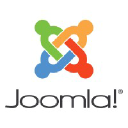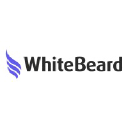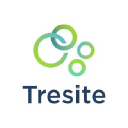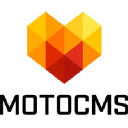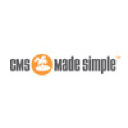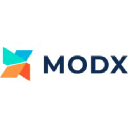
Orchard CMS
What is Orchard Core?
Orchard Core is an open-source, modular, and multi-tenant application framework built with ASP.NET Core. It is a redevelopment of Orchard CMS on ASP.NET Core.
Key Features
- Modular: Orchard Core is composed of modules that plug into a common framework. You can add, remove, and replace modules to fit your needs.
- Multi-tenant: Orchard Core allows you to host multiple websites on the same environment, each with their own content, themes, and configurations.
- Extensible: Modules and themes can be extended or overridden. You can create your own modules and themes.
- Flexible: Orchard Core can be used as a full CMS, a headless CMS, or an application framework.
- Decoupled: The front-end and back-end of Orchard Core are decoupled, communicating through APIs.
Orchard Core Modules
Orchard Core provides various built-in modules, including:
- Content Management
- Workflows
- Layers
- Recipes
- Themes
- Liquid Templating
Community and Resources
The Orchard Core project is driven by its community. Key resources include:
- GitHub Repository: The source code and issue tracking for Orchard Core are hosted on GitHub.
- Gitter: The community uses Gitter for real-time discussions and support.
- Documentation: Extensive documentation is available, covering getting started guides, fundamental concepts, and guides for developers and content editors.
- Crowdin: Crowdin is used for translating the Orchard Core UI and documentation.
Getting Started
To get started with Orchard Core:
- Install the latest .NET SDK.
- Install the Orchard Core CMS templates from NuGet.
- Create a new Orchard Core CMS project using the dotnet new command.
- Develop your website.
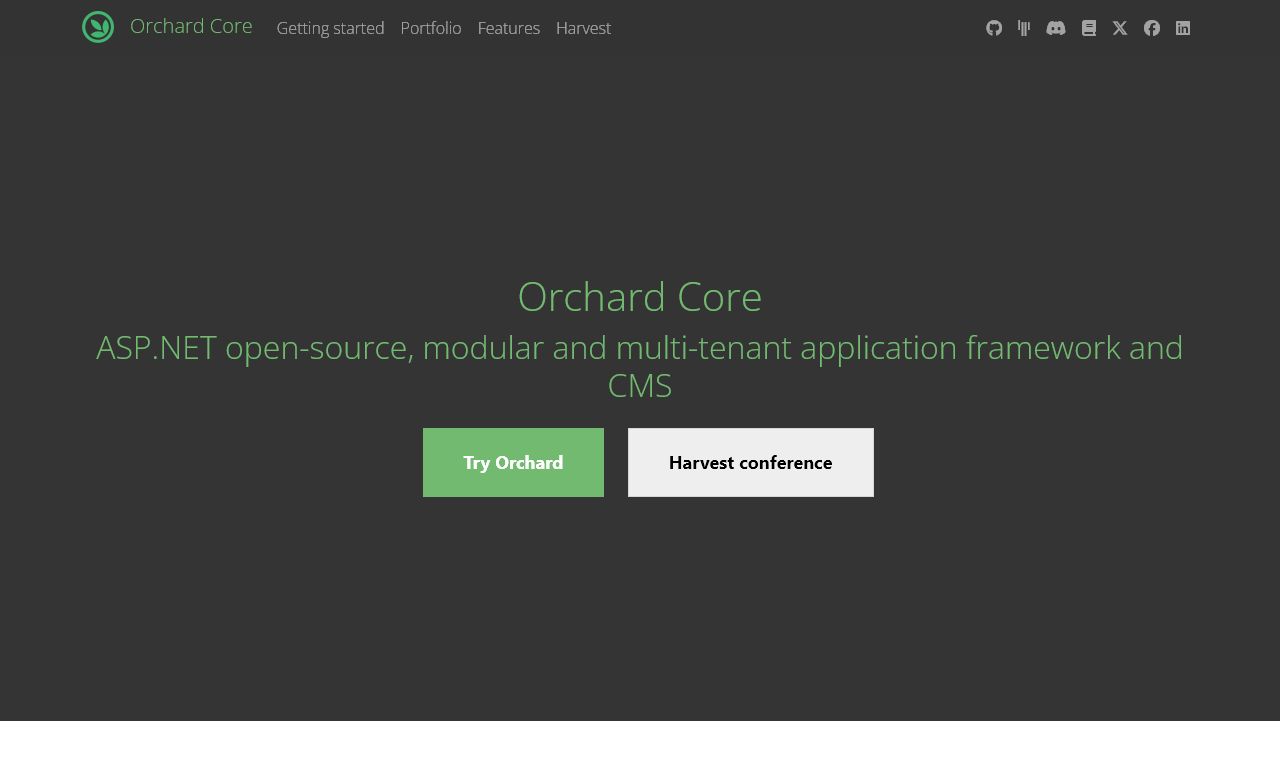
Orchard CMS
Orchard Core is a powerful and flexible open-source content management system (CMS) built on ASP.NET Core, offering developers and content creators a robust platform for building modern web applications.
In this review, we'll explore the key features and capabilities of Orchard Core, helping you determine if it's the right choice for your project.
1. Overview and purpose of the CMS
Orchard Core is designed to provide a modular and extensible framework for building content-driven web applications.
It offers a decoupled architecture, allowing developers to create headless CMS solutions or traditional websites.
The CMS is built on ASP.NET Core, leveraging the latest technologies and best practices in web development.
2. User interface and ease of use
Orchard Core features a clean and intuitive admin interface, making it accessible for both developers and content editors.
The dashboard provides a comprehensive overview of site management tasks and content creation options.
Users can customize their experience through personalized dashboards and role-based access controls.
3. Content creation and editing tools
The CMS offers a robust set of content creation tools, including a WYSIWYG editor and support for markdown.
Content types are highly customizable, allowing users to create structured content with ease.
The platform supports content versioning and scheduling, enhancing workflow management.
4. Asset management capabilities
Orchard Core includes a comprehensive media library for managing images, videos, and other digital assets.
The system supports drag-and-drop uploads and integrates seamlessly with content creation tools.
Users can organize assets into folders and apply metadata for improved searchability.
5. Customization and extensibility options
As an open-source platform, Orchard Core offers extensive customization options through its modular architecture.
Developers can create custom modules and themes to extend functionality and design.
The CMS supports dependency injection and follows SOLID principles, promoting clean and maintainable code.
6. SEO features and optimization tools
Orchard Core provides built-in SEO tools to help improve search engine rankings and visibility.
Features include customizable meta tags, XML sitemaps, and URL aliasing.
The platform also supports schema markup and integrates with popular SEO plugins.
7. Security measures and user management
Security is a top priority in Orchard Core, with features like role-based access control and two-factor authentication.
The CMS follows OWASP security guidelines and regularly releases security updates.
User management tools allow for granular control over permissions and access levels.
8. Performance and scalability
Built on ASP.NET Core, Orchard Core offers excellent performance and scalability out of the box.
The platform supports caching mechanisms and content delivery networks (CDNs) for improved speed.
Orchard Core can handle high-traffic websites and complex applications with ease.
9. Integration with third-party tools and services
The CMS provides a wide range of integration options through its modular architecture and API support.
Popular integrations include analytics tools, email marketing platforms, and e-commerce systems.
Developers can leverage the GraphQL API for seamless integration with front-end frameworks and external services.
10. Pricing and support options
Orchard Core is a free, open-source CMS with no licensing fees.
Commercial support and hosting options are available through various third-party providers.
The official documentation and active community forums provide extensive resources for users and developers.
11. Mobile responsiveness and multi-device support
Orchard Core offers responsive design capabilities out of the box, ensuring websites look great on various devices.
The admin interface is also mobile-friendly, allowing content managers to work on-the-go.
Developers can leverage adaptive rendering techniques to create tailored experiences for different screen sizes.
12. Multilingual capabilities and localization features
The CMS provides robust support for multilingual content, enabling the creation of sites in multiple languages.
Orchard Core includes built-in translation management tools for efficient content localization.
The platform supports right-to-left (RTL) languages and offers customizable language selection options.
13. Workflow management and collaboration tools
Orchard Core features a flexible workflow engine for automating content approval and publication processes.
The platform supports content staging and preview environments for collaborative editing.
Users can benefit from task assignment and notification systems to streamline team collaboration.
14. Version control and content revision history
The CMS offers comprehensive version control for all content types, allowing users to track changes over time.
Content editors can easily compare revisions and revert to previous versions when needed.
Orchard Core supports audit trails, providing accountability and transparency in content management.
15. Analytics and reporting functionalities
While Orchard Core doesn't include built-in analytics, it integrates seamlessly with popular tools like Google Analytics.
The platform's modular architecture allows for the development of custom reporting modules.
Users can leverage the GraphQL API to create tailored dashboards and data visualizations.
16. E-commerce capabilities
Orchard Core can be extended to support e-commerce functionality through third-party modules and integrations.
Popular e-commerce platforms like nopCommerce can be integrated for advanced online store capabilities.
Developers can create custom e-commerce solutions using Orchard Core's flexible architecture.
17. Compliance with accessibility standards
Orchard Core is designed with accessibility in mind, adhering to WCAG 2.1 guidelines.
The platform supports the creation of accessible content through semantic markup and ARIA attributes.
Developers can leverage built-in accessibility features to ensure compliance with international standards.
18. Documentation and learning resources
Orchard Core provides extensive documentation covering all aspects of the platform.
The community offers numerous tutorials, video courses, and blog posts for learning and skill development.
Regular webinars and conferences provide opportunities for in-depth learning and networking.
19. Community support and ecosystem
Orchard Core boasts a vibrant and active community of developers and users.
The GitHub repository has over 4,000 stars and 1,000 forks, indicating strong community engagement.
Community-driven resources include forums, Slack channels, and local user groups for support and knowledge sharing.
20. Migration tools and processes from other platforms
Orchard Core offers migration tools for transitioning from Orchard 1.x to the latest version.
The platform's flexible architecture allows for the development of custom migration scripts for other CMS platforms.
Documentation and community resources provide guidance on migrating content and data from various sources.
Conclusion
Orchard Core stands out as a powerful and flexible CMS solution, offering a wide range of features and capabilities for developers and content creators alike.
With its robust architecture, extensive customization options, and active community support, Orchard Core is well-positioned to meet the diverse needs of modern web development projects.
As the platform continues to evolve and improve, it remains a compelling choice for those seeking a scalable and adaptable content management system built on cutting-edge technologies.
Website:

